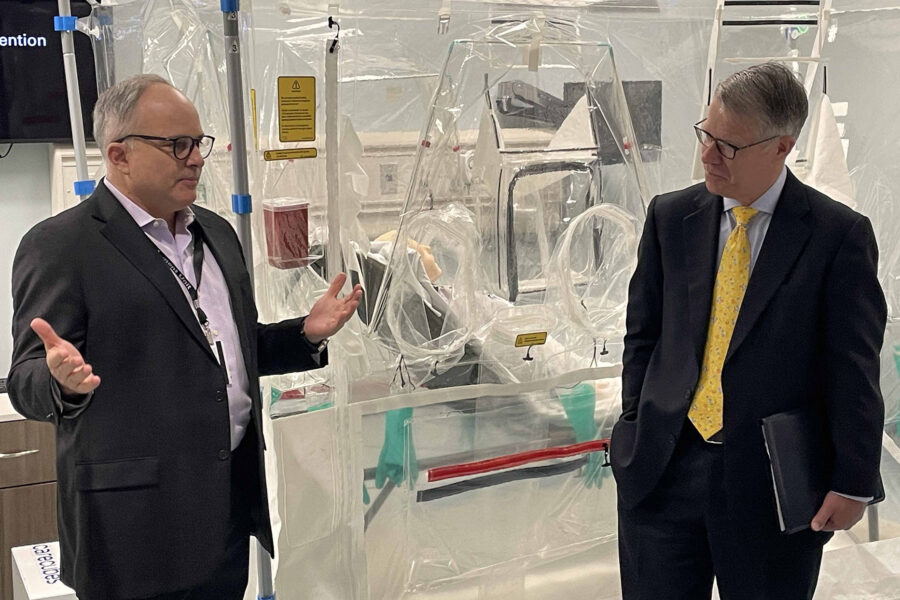Maj. Gen. (ret.) Paul Friedrichs, MD, director of the new White House Office of Pandemic Preparedness and Response Policy, and his wife, Rita Friedrichs, MD, toured the Davis Global Center in December. Dr. Friedrichs was in Omaha to be awarded an honorary Doctor of Science degree at the UNMC Winter Commencement for high distinction in his service to our nation through the areas of science and medicine.
Dr. Friedrichs previously served as senior director for global health security and biodefense at the National Security Council. This followed a decades-long career in the U.S. Air Force, which culminated in serving as the joint staff surgeon at the Pentagon. Dr. Friedrichs provided medical advice for the chairman of the Joint Chiefs of Staff on Department of Defense operations and served as medical advisor to the Department of Defense COVID-19 Task Force. In this role, he coordinated all issues related to health services to include operational medicine, force health protection and readiness among the combatant commands, the Office of the Secretary of Defense and the services.
During a busy two-day visit, Dr. Friedrichs met with UNMC Chancellor Jeffrey P. Gold, MD, Nebraska Medicine CEO Jim Linder, MD, and other medical center leaders. He also gave a Breakthrough Thinking series presentation titled “Rethinking Biopreparedness.”
His tour was hosted by Chris Kratochvil, MD, vice chancellor for external relations, and Dossy Felts, associate director of administration and operations at the UNMC Global Center for Health Security.
Dr. Friedrichs, who had visited UNMC before the building opened, was seeing the facility for the first time. His tour of the iEXCEL program was led by Michael Hollins.
“This is really a benchmark facility of the ones I have visited,” Dr. Friedrichs said of iEXCEL.
“What’s particularly exciting about this is, Nebraska’s been so committed to intervention and partnerships, and this really provides the platform in which you can do that, not just with your own staff and faculty but also with industry partners, with federal, state, local, tribal partners, you can bring anybody in here and leverage this. So I’m impressed with what you all have built.”
After touring the Global Center for Health Security’s Training, Simulation and Quarantine Center with Felts, he expanded on his thoughts.
“One of the things that’s remarkable about the work here is, this is not just the theoretical and academic, this is the practical that can be applied today if necessary,” he said. “These are the sorts of real-world solutions that we know we need right now. So this is a great example of how the University of Nebraska is helping not only the population of Nebraska itself but to solve a problem that we’re struggling with across the whole country and with many of our global partners, as well.”
